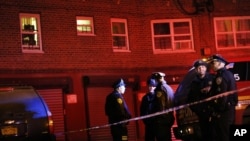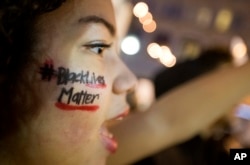The U.S. Justice Department is beginning a new program Tuesday to train more than 28,000 federal law enforcement agents, prosecutors and other staff to recognize and address unconscious bias in their work.
The training will include issues of race, ethnicity, gender, religion, sexual orientation, gender identity and socioeconomic status.
Deputy Attorney General Sally Yates said the department has a responsibility to ensure the criminal justice system is fair.
"Given that the research is clear that most people experience some degree of unconscious bias, and that the effects of that bias can be countered by acknowledging its existence and utilizing response strategies, it is essential that we provide implicit bias training to all of our prosecutors and law enforcement agents," she said.
Yates is among the first group getting the training, which will also be given to agents from the Federal Bureau of Investigation, Drug Enforcement Administration, Bureau of Alcohol, Tobacco and Firearms and the U.S. Marshals Service.
A document released Monday along with the agency's announcement of the program cites research saying people can reduce their implicit biases in part by acknowledging they exist, along with the effects of having positive interactions with stereotyped groups and using behavioral responses to override automatic assumptions people may have.
"Implicit bias also presents unique challenges to effective law enforcement, because it can alter where investigators and prosecutors look for evidence and how they analyze it without their awareness or ability to compensate," Yates wrote in a memo to agency employees.
Last year, a task force set up by President Barack Obama to examine policing in the United States said a key component of fair and impartial law enforcement is understanding and acknowledging human biases.
Witnesses told the panel that police officers need a change in culture that focuses on what they have in common with members of the public. The task force also recommended departments look at diversity in their hiring, "including race, gender, language, life experience and cultural background."
The issue of bias in policing, particularly racial discrimination, gained renewed prominence during the past few years with the killings of unarmed African-Americans by officers and subsequent protests across the country.
A prominent example was the 2014 shooting of Michael Brown by a white police officer in the town of Ferguson, Missouri. A Justice Department report slammed the police and court system for practices that disproportionately targeted African-Americans.
In July 2015, the American Bar Association and the NAACP Legal Defense and Educational Fund put out a joint statement calling for steps to end bias in the criminal justice system, including training on implicit bias for lawyers and judges. Data on U.S. state and federal prisons shows that two-thirds of prisoners are minorities, something the groups say make it hard to believe the system is unaffected by racial biases.
"While we believe that the overwhelming percentage of law enforcement officers, prosecutors and judges are not racist, explicit bias remains a real factor in our country -- and our criminal justice system -- and implicit or unconscious bias affects even those who may believe themselves to be fair."





